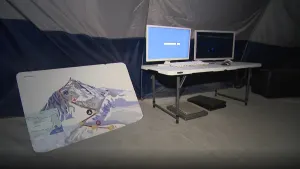More Stories
A seemingly healthy young father found himself in the hospital with heart complications following his first dose of the Pfizer COVID-19 vaccine.
There are still many unanswered questions when it comes to Mody Shehab’s near-death experience. But one thing that he and his doctor are certain of is that he won’t be getting a second dose of the vaccine any time soon.
“They did sonograms. They did an hour and a half of MRIs. Nothing was wrong. So I said the only thing I did was I took the vaccine on Sunday,” Shehab says.
Shehab was hospitalized at Valley Hospital in Ridgewood.
“[My doctor’s] eyes just opened up and he said, ‘Oh my God.’ He said, ‘Do not take that second dose.’ He said, ‘Your body had a bad reaction to the first shot,’” Shehab says.
In November 2020, Shehab and his family should have been preparing for the birth of his first child. But instead, Shehab and his wife were battling COVID-19. Shehab, who had more severe symptoms from the virus, was hospitalized after his second week of experiencing symptoms.
“The chest pains were so bad. I felt like I was in a fight with Mike Tyson and I didn’t know how to use my hands,” he says.
Shehab went to the hospital and was diagnosed with pneumonia on top of his COVID-19 diagnosis. He was ultimately admitted and then released from the hospital three weeks later.
He says that he had a new lease on life and decided that once the vaccine was available, he would get it. The call finally came in March. But three days after his first dose, he started to experience chest pains.
“I looked my wife in the eyes and I said, ‘You’re not going to believe this, but I think I’m having a heart attack,’” Shehab says. “My neck is getting numb. I said I’m feeling tingling in my hands. I said, ‘I don’t feel good.’”
Shehab was told that he had Myopericarditis, not common in young patients, but possible. And the only possible cause as per his doctor was the COVID-19 shot he'd gotten three days prior.
“The timing of him receiving the vaccine and him presenting, it’s something that is very difficult to overlook,” says Dr. Robert Baklajian.
It's unclear if the vaccine caused Shehab’s condition, but for now, the new father is playing it safe and will not be getting his second dose.
Baklajian says that Myopericarditis has a wide spectrum of possible causes, including idiopathic infectious diseases, meaning their origins are unknown.
Shehab says he is feeling like himself again and he reported his reaction to the Centers for Disease Control and Prevention so they can look into it
More from News 12
1:31

What's Cooking: Uncle Giuseppe's Marketplace's prime rib roast
1:30

Looking for a road trip? Check out Big Snow at American Dream in East Rutherford
1:27

What's Cooking: Uncle Giuseppe's quiche lorraine
2:34

Guide: Safety tips to help prevent home burglaries
2:19

Guide: Safety measures to help prevent fires and how to escape one
2:36
